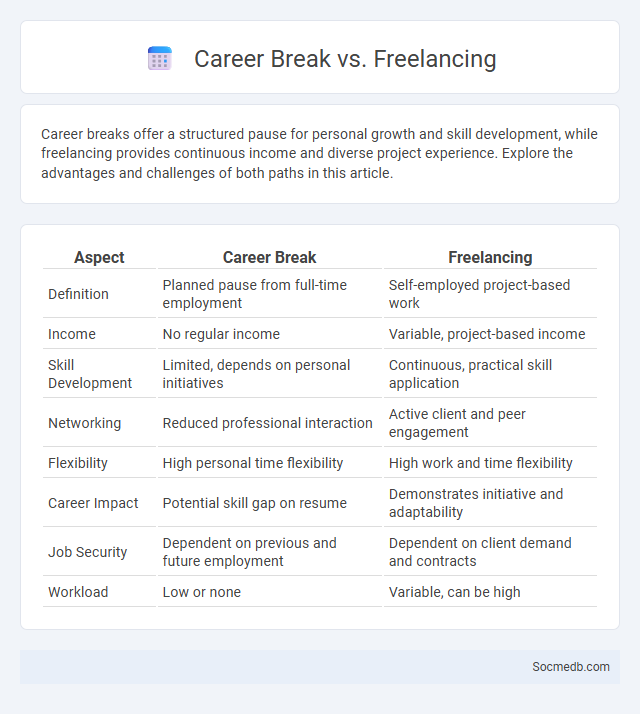
Photo illustration: Career break vs Freelancing
Career breaks offer a structured pause for personal growth and skill development, while freelancing provides continuous income and diverse project experience. Explore the advantages and challenges of both paths in this article.
Table of Comparison
| Aspect | Career Break | Freelancing |
|---|---|---|
| Definition | Planned pause from full-time employment | Self-employed project-based work |
| Income | No regular income | Variable, project-based income |
| Skill Development | Limited, depends on personal initiatives | Continuous, practical skill application |
| Networking | Reduced professional interaction | Active client and peer engagement |
| Flexibility | High personal time flexibility | High work and time flexibility |
| Career Impact | Potential skill gap on resume | Demonstrates initiative and adaptability |
| Job Security | Dependent on previous and future employment | Dependent on client demand and contracts |
| Workload | Low or none | Variable, can be high |
Understanding Career Breaks: Definition and Purpose
Career breaks refer to intentional pauses in professional work intended to recharge skills, pursue personal development, or address life events. Understanding the purpose behind these breaks helps you communicate their value on social media profiles and resumes effectively. Highlighting how a career break enhanced your expertise or personal growth can positively influence your professional image.
What Is Freelancing? Overview and Key Features
Freelancing is a form of self-employment where individuals offer services independently, often through social media platforms that connect clients and freelancers. Key features include flexible work hours, diverse project opportunities, and direct communication with clients, allowing you to build a personalized career. Social media enhances freelancing by providing visibility, networking possibilities, and access to a global client base.
Career Break vs Freelancing: Core Differences
Career breaks involve a planned pause from professional work to pursue personal growth, education, or travel, often resulting in a temporary withdrawal from the job market. Freelancing entails actively offering specialized services independently, generating income through project-based work without long-term employer commitments. Unlike career breaks, freelancing maintains continuous professional engagement and skill development, influencing social media presence differently by highlighting ongoing expertise versus personal journeys.
Benefits of Taking a Career Break
Taking a career break offers significant benefits for mental health, personal development, and skill enhancement. It allows professionals to recharge, reduce burnout, and gain new perspectives, often leading to increased productivity and creativity upon return. Social media provides a platform to share experiences, network with like-minded individuals, and access resources for career development during a break.
Advantages and Challenges of Freelancing
Freelancing offers you flexibility and control over your schedule, enabling better work-life balance and the opportunity to diversify income streams through social media platforms like Instagram and LinkedIn. However, challenges include inconsistent income, self-discipline demands, and the need to constantly market your personal brand to attract and retain clients. Effective use of social media analytics can help optimize your outreach and build a professional online presence for sustainable freelance success.
Financial Implications: Career Breaks vs Freelancing
Social media professionals face distinct financial implications when choosing between career breaks and freelancing. Career breaks often result in temporary income loss and potential setbacks in retirement contributions, while freelancing offers variable income streams with opportunities for higher earnings but inconsistent cash flow. Understanding tax obligations, client acquisition costs, and the impact on benefits like health insurance is crucial for optimizing financial outcomes in social media careers.
Skill Development: Which Path Enhances Your Growth?
Mastering social media platforms like LinkedIn, Instagram, and TikTok sharpens digital marketing, content creation, and data analytics skills essential for career advancement. Engaging in targeted courses and practical experiences enhances your communication, branding, and strategic planning abilities. Choosing the right skill development path on social media accelerates your growth in the evolving digital landscape.
Impact on Long-Term Career Prospects
Social media presence significantly influences long-term career prospects by shaping your professional reputation and expanding networking opportunities. Employers often review candidates' online profiles to gauge personal values and communication skills, affecting hiring decisions and promotions. Maintaining a strategic and positive digital footprint enhances your visibility and credibility in your industry.
Personal Well-being: Balancing Life and Work Choices
Maintaining a healthy balance between life and work choices is essential for your personal well-being amid the constant presence of social media. Setting boundaries on screen time and prioritizing offline interactions help reduce stress and prevent burnout. Mindful use of social platforms promotes mental clarity, emotional health, and overall life satisfaction.
Choosing the Right Path: Key Factors to Consider
Choosing the right social media path requires analyzing your target audience's demographics and behaviors to ensure your content resonates effectively. Evaluating platform algorithms, engagement rates, and content formats helps optimize your strategy for maximum reach and interaction. By aligning your goals with the strengths of each platform, you can enhance brand visibility and drive meaningful connections on social media.
 socmedb.com
socmedb.com